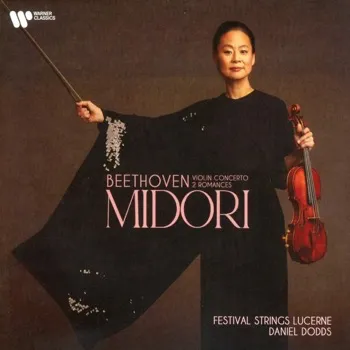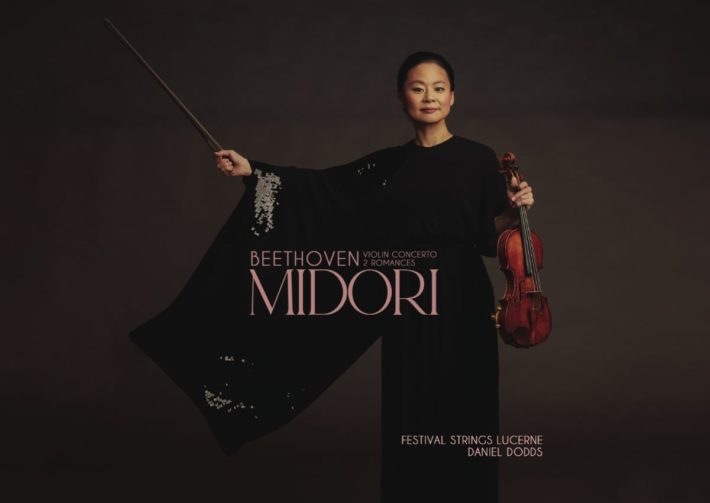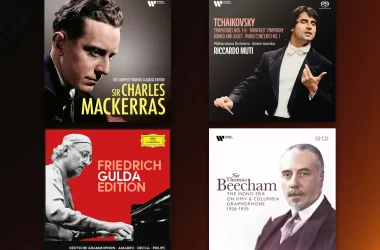Surprisingly, this is Midori’s first recording of the Beethoven often-recorded Violin Concerto and two Romances. She is accompanied by The Festival Strings Lucerne, led by concertmaster Daniel Dodds. This is my first experience of the ensemble, although it has been in existence since 1956, with several dozen recordings across various labels.

First impressions are lackluster. In the opening moments of the first movement, the oboe has an intonation issue moving to its second note (surely a retake was warranted). Otherwise, the accompaniment is played with precision and warmth, but lacks forward momentum and characterization, especially in the winds. For example, at 0’40” the ascending woodwind scales are gracefully dispatched, but turn to the accompaniment by the Bremen Deutsche Kammerphilharmonie and Jarvi for Janine Jansen (Decca) or to the Deutsches Symphonie-Orchester Berlin and Ticciati for Christian Tetzlaff (Ondine), and those same runs sparkle with anticipation. In Lucerne, the first tutti (1’02”) is sedated and underpowered, as if the orchestra is seeking to smooth out some of Beethoven’s rough edges. Indeed, the entire orchestral introduction seems somewhat bland.
Midori’s initial entrance (3’12”) is beautifully captured, gently emerging from the orchestral texture, with a natural balance between soloist and ensemble. But one quickly realizes that the orchestra’s introduction was meant to match Midori’s interpretative approach, which, while beautifully played, embraces an overly refined, molded aesthetic that at times robs Beethoven’s music of its emotional potency.
Midori plays with faultless intonation and masterly control of dynamics (sample the playing at 7’12”). But she seems reticent to imprint any strong interpretative ideas on the music. There is also a tendency to dawdle in certain passages that becomes wearisome with repeated hearings. It is as if Midori savors and shapes every note until it becomes overly precious. Listen to the passage beginning at 5’22” – each note has a burnished, rounded tone, yet ultimately it all feels excessively manicured. Turn to Kopatchinskaja in the same passage (5’11”) and one hears a bolder imagination at work, drawing out a greater variety of color from the violin, a great accomplishment considering she plays with gut strings and classical bow. Both she and Tetzlaff allow themselves more rubato, and greater flexibility in this section, and indeed throughout the movement, which imparts an engaging improvisatory freedom to their performances.
Midori, as Janine Jansen did in her version, plays Fritz Kreisler’s cadenzas. She plays with remarkable accuracy and a consistently beautiful tone, but seems intent on maintaining a basic unchanging pulse that denies any sense of rhapsodic fantasy. Jensen’s reading is technically just as impressive, but she also adopts an improvisatory freedom that makes the cadenza seem like her own spontaneous creation.
The slow movement is much more successful. Beethoven’s achingly beautiful melody seems to engender a deeper connection between Midori and her players. She spins an elegant and gossamer line, maintaining a velvety richness even into the instrument’s highest register.
Forward momentum again becomes an issue in the final movement – it is not that the performance is unduly slow, but there is a lack of urgency to the reading (for that, turn to Jarvi and Ticciati). While Midori and her Lucerne players find a beguiling playfulness throughout the movement, there is a cautious moderation that renders the orchestral accompaniment flat. Jarvi, Ticciati and Herreweghe establish greater joy-de-vivre, which then elicits more extroverted and passionate readings from their soloists. While Midori’s reading is beautiful and distinguished, one is left feeling that we have admired Beethoven’s work under glass in a carefully lit museum case. In other readings mentioned in this review, we find a more complete sense of the soul of Beethoven’s music.
The performances of the Romances are fully convincing. Midori and the orchestra recognize that these are gentle character pieces, and they are performed with nicely flowing tempos and deft, crisp phrasing.
The engineered sound captures the warmth of the Lucerne concert hall, and the balance between soloist and orchestra is exemplary. Midori provides her own thoughtful program notes, in which she explains this recording is all that remains from a European tour, featuring this program and these performers, that was canceled because of the pandemic. Just a few months ago I praised a new recording of Bach’s St. John Passion by Bach Collegium Japan made in similar circumstances (read here). That recording’s impassioned urgency makes for a compelling and deeply communicative performance. If only that same urgency and passion had found its way into this recording.
Recommended Comparisons
Tetzlaff | Jansen | Schneiderhan | Kopatchinskaja
Beethoven – Violin Concerto, 2 Romances
Midori – Violin
Festival Strings Lucerne
Warner Classics, CD 9029517920




















